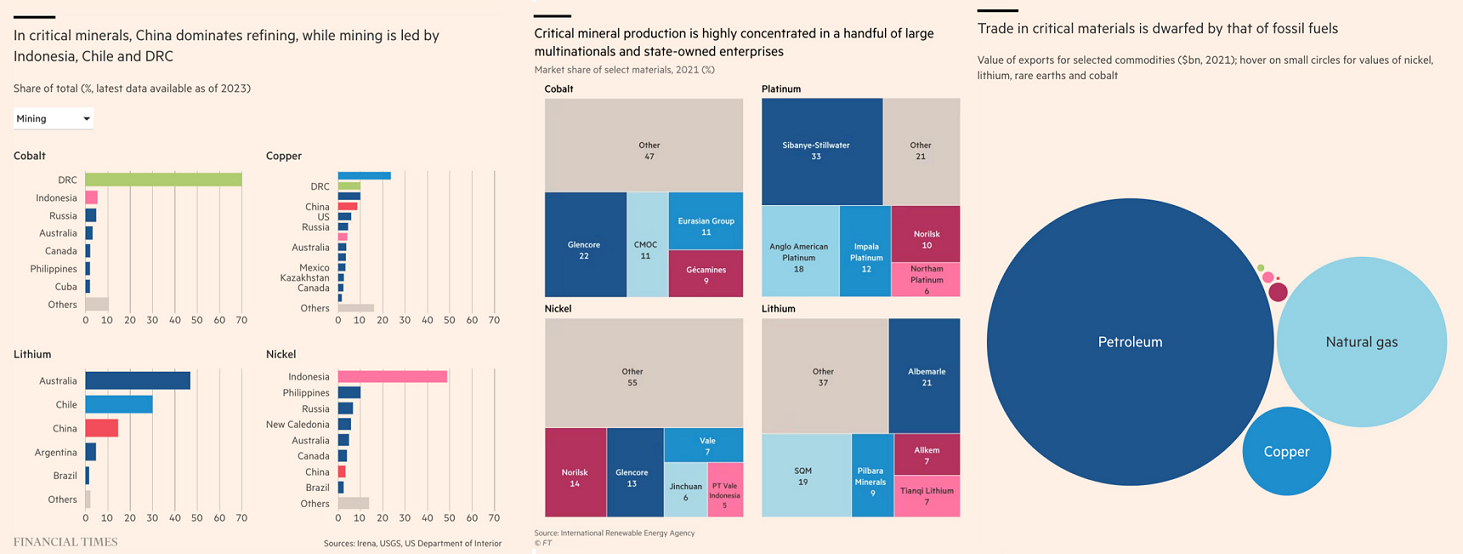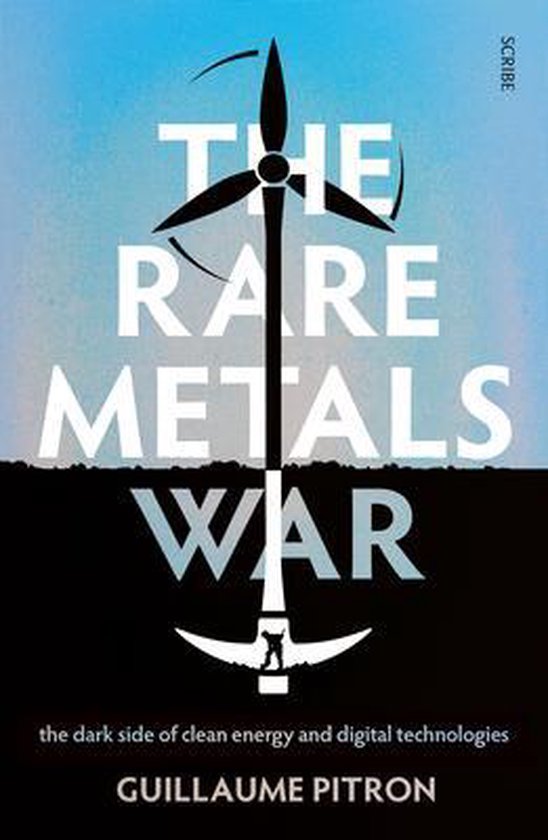Home
| About
| Mine Tracker
| RSS
| Footer
▄▄▄▄▄▄▄▄▄▄▄▄▄▄▄▄▄▄▄▄▄▄▄▄▄▄▄▄▄▄▄▄▄▄▄▄▄▄▄▄▄▄▄▄▄▄▄▄▄▄▄▄▄▄▄▄▄▄▄▄▄▄▄▄▄▄▄▄▄▄▄▄▄▄▄▄▄▄▄▄▄▄▄▄▄▄▄▄▄▄▄▄▄▄▄▄ █▄▄░▄▄█░▄▄▀█░▄▄▀█▀▄▀█░▄▄███░▄▄▀█░▄▄▀█░▄▀███▄▄░▄▄█░▄▄▀█░▄▄▀█▀▄▀█░▄▄█░▄▄▀█░▄▄▀██▄██░███▄██▄░▄█░██░ ███░███░▀▀▄█░▀▀░█░█▀█░▄▄███░▀▀░█░██░█░█░█████░███░▀▀▄█░▀▀░█░█▀█░▄▄█░▀▀░█░▄▄▀██░▄█░███░▄██░██░▀▀░ ███░███▄█▄▄█▄██▄██▄██▄▄▄███▄██▄█▄██▄█▄▄██████░███▄█▄▄█▄██▄██▄██▄▄▄█▄██▄█▄▄▄▄█▄▄▄█▄▄█▄▄▄██▄██▀▀▀▄ ▀▀▀▀▀▀▀▀▀▀▀▀▀▀▀▀▀▀▀▀▀▀▀▀▀▀▀▀▀▀▀▀▀▀▀▀▀▀▀▀▀▀▀▀▀▀▀▀▀▀▀▀▀▀▀▀▀▀▀▀▀▀▀▀▀▀▀▀▀▀▀▀▀▀▀▀▀▀▀▀▀▀▀▀▀▀▀▀▀▀▀▀▀▀▀▀
Rare Earth Graphs from FT


Book; The Rare Metals War
https://scribepublications.co.uk/books-authors/books/the-rare-metals-war-9781912854264

Translated from the French, Guillaume Pitron’s The Rare Metal War (2018) is a blistering journey through the political, strategic and environmental consequences of the world’s need for rare earth minerals to drive the energy transition. China’s strategic manipulation and landgrab of skills, industries and resources is detailed with admiring scorn while the western’s world apathy is considered as a general weakness of capitalism. The book is high on opinion and is meant to pack a punch. There are however also several informative appendices with data and a number of interesting factoids that I enjoyed. This is a activism more than journalism ending with the conclusion that Europe, and France especially, should restart their mining industries and do it to the highest standards; on the argument that clean mines in Europe for metals we use ourselves will prevent unmitigated environmental degradation in less regulated places like China.
https://scribepublications.co.uk/books-authors/books/the-rare-metals-war-9781912854264

Translated from the French, Guillaume Pitron’s The Rare Metal War (2018) is a blistering journey through the political, strategic and environmental consequences of the world’s need for rare earth minerals to drive the energy transition. China’s strategic manipulation and landgrab of skills, industries and resources is detailed with admiring scorn while the western’s world apathy is considered as a general weakness of capitalism. The book is high on opinion and is meant to pack a punch. There are however also several informative appendices with data and a number of interesting factoids that I enjoyed. This is a activism more than journalism ending with the conclusion that Europe, and France especially, should restart their mining industries and do it to the highest standards; on the argument that clean mines in Europe for metals we use ourselves will prevent unmitigated environmental degradation in less regulated places like China.
KoBold Metals; Company Website
https://www.koboldmetals.com/
Finding the materials of the future with AI KoBold Metals® discovers the materials critical for the electric vehicle and renewable energy revolutions
https://www.koboldmetals.com/
Finding the materials of the future with AI KoBold Metals® discovers the materials critical for the electric vehicle and renewable energy revolutions
From the White House: Building resilient supply chains
https://whitehouse.gov/wp-content/uploads/2021/06/100-day-supply-chain-review-report.pdf

More secure and resilient supply chains are essential for our national security, our economic security, and our technological leadership.
National security experts, including the Department of Defense, have consistently argued that the nation’s underlying commercial industrial foundations are central to our security. Reports from both Republican and Democratic administrations have raised concerns about the defense industry’s reliance on limited domestic suppliers; a global supply chain vulnerable to disruption; and competitor country suppliers. Innovations essential to military preparedness—like highly specialized lithium-ion batteries—require an ecosystem of innovation, skills, and production facilities that the United States currently lacks. The disappearance of domestic production of essential antibiotics impairs our ability to counter threats ranging from pandemics to bio-terrorism, as emphasized by the FDA’s analysis of supply chains for active pharmaceutical ingredients.
Our economic security—steady employment and smooth operations of critical industries—also requires secure and resilient supply chains. For more than a decade, the Department of Defense has consistently found that essential civilian industries would bear the preponderance of harm from a disruption of strategic and critical materials supply. The Department of Energy notes that, today, China refines 60 percent of the world’s lithium and 80 percent of the world’s cobalt, two core inputs to high-capacity batteries—which presents a critical vulnerability to the future of the U.S. domestic auto ind
https://whitehouse.gov/wp-content/uploads/2021/06/100-day-supply-chain-review-report.pdf

More secure and resilient supply chains are essential for our national security, our economic security, and our technological leadership.
National security experts, including the Department of Defense, have consistently argued that the nation’s underlying commercial industrial foundations are central to our security. Reports from both Republican and Democratic administrations have raised concerns about the defense industry’s reliance on limited domestic suppliers; a global supply chain vulnerable to disruption; and competitor country suppliers. Innovations essential to military preparedness—like highly specialized lithium-ion batteries—require an ecosystem of innovation, skills, and production facilities that the United States currently lacks. The disappearance of domestic production of essential antibiotics impairs our ability to counter threats ranging from pandemics to bio-terrorism, as emphasized by the FDA’s analysis of supply chains for active pharmaceutical ingredients.
Our economic security—steady employment and smooth operations of critical industries—also requires secure and resilient supply chains. For more than a decade, the Department of Defense has consistently found that essential civilian industries would bear the preponderance of harm from a disruption of strategic and critical materials supply. The Department of Energy notes that, today, China refines 60 percent of the world’s lithium and 80 percent of the world’s cobalt, two core inputs to high-capacity batteries—which presents a critical vulnerability to the future of the U.S. domestic auto ind